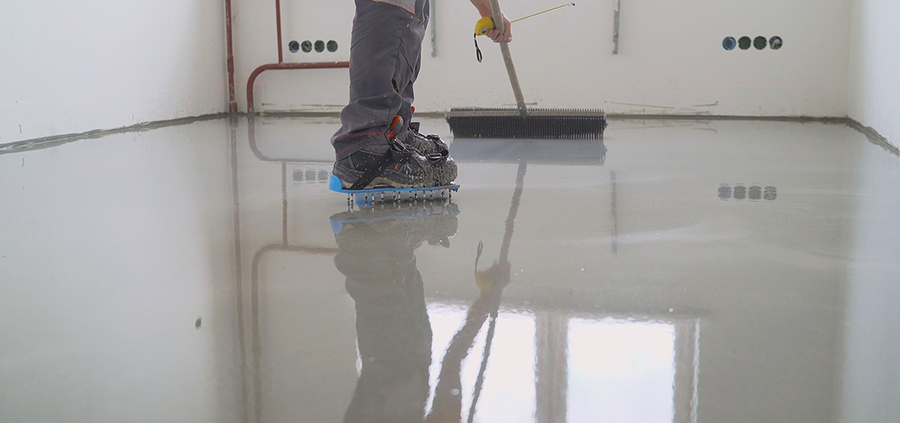What is Gypsum Underlayment and Why is it Considered a Specialty Trade?
Due to its unique benefits in both installation and performance, gypsum underlayment—”gyp” for short—is increasingly being used in all facets of commercial, industrial, and residential construction. While gyp is relatively simple to install and pairs well with a wide range of floor coverings, it is considered a specialty trade. Let’s take a look at why installing gypsum underlayment requires the knowledge and skill of a specialty contractor.
A Specialty Trade Requires a Specialty Contractor—But What Does That Mean?
Whereas a general contractor is hired to oversee the entire construction job from start to finish, a specialty contractor is responsible for the completion of one specific job within the overall project. For example: plumbing, lighting, and HVAC projects all require a contractor who has been extensively trained in those areas.
A specialty contractor is expected to have greater knowledge, education, experience, and specialized expertise than a general contractor. In addition to having extensive knowledge about the products they install, they are tasked with understanding the safety implications, code requirements, and governmental regulations of these products. Since they are licensed to perform a specific task they can also be held responsible for the long-term maintenance, repair, and upkeep of what they installed.
When it comes to flooring underlayments, each type of underlayment or substrate—including gypsum underlayment—presents the installer with a unique set of problems. The installer must develop an understanding of the specific characteristics of each product they work with.
What Exactly is Gypsum Underlayment?
Gypsum underlayment is a mixture of gypsum plaster, Portland cement, and sand (additives are sometimes included as well). It is typically applied over structural concrete or precast concrete planks to create a smooth surface that delivers superior strength, sound control, and fire resistance. Gyp is almost completely self-leveling, sets quickly (faster than concrete), requires minimal surface preparation, and has the same compressive strength as regular concrete.
Introduced more than 65 years ago to serve as an alternative to cellular concrete in multifamily construction, gypsum underlayment is now commonly used in many other commercial and residential settings. It is able to withstand heavy traffic without powdering, chipping, or cracking, and is ideal for use in residential, multifamily, commercial, radiant heating, and renovation projects. Gyp accepts virtually any type of floor covering, including vinyl composition tile, ceramic tile, wood laminate, hardwood, and carpeting.
Gyp is Mixed On-Site With Specialized Equipment
Installing gyp requires specialized equipment and the knowledge to properly mix the ingredients to create an ideal underlayment. The mixture of gypsum plaster, cement, and sand that gyp is comprised of is prepared on site using a specialized truck which contains a tank for water, a mixing tank, a holding tank, a pump, and a conveyer for the sand and gypsum. A hopper for the sand and gypsum is mounted externally on the truck.
First, the sand and gypsum are added to the hopper and mixed. Most of the needed water is added to the mixing tank, then the sand and gypsum are mixed into it. Next the rest of the water is added until the proper consistency is attained. If any additives are being used they are added at this time, and the whole batch is moved to the holding tank to be pumped out into the required area via long hoses.
Moisture Considerations for Gyp
Gyp must be tested for moisture content prior to installation, as excess moisture in the substrate can cause adhesive failures, damage to the flooring, and mold issues. The less permeable the flooring is, the more impact excess moisture will have on it. In certain conditions the moisture can condensate, causing weakened underlayment, damaged adhesive, and an environment conducive to mold growth.
The moisture content allowable in each instance is directly related to the floor covering being installed. Additionally, the type of meter required to test the moisture content varies among gyp manufacturers, and the thickness of the pour affects how the meters are used.
The value in knowing the variables in the acceptable moisture content of gyp, the ways to test for that moisture, and how the moisture will affect the floor covering being installed makes this a job for a specialist.
Gyp and Various Floor Coverings
With proper preparation, almost any type of floor covering can be installed over gypsum underlayment. The trick is to know what type of preparation each floor covering requires. For instance: to install ceramic tile on top of gyp, it’s recommended to use an isolation membrane or special flexible bonding agent; for laminated wood flooring, a urethane adhesive or solvent-based adhesive is required. There are similar recommendations for every type of floor covering, and for each one there are specific products that are better than others. This is the kind of knowledge a specialty contractor brings with them.
As you can see, there is a lot to know when it comes to mixing, pouring, and drying gypsum underlayment, as well as preparing it properly for each type of floor covering. This breadth of information, as well as the skills needed for each step, is what makes gyp a specialty trade.
ATR is a Gypsum Underlayment Specialist
ATR Gypsum Floors is a brand in the ATR Commercial Flooring family that specializes in gypsum cement-based underlayments. With new technology and equipment, industry expertise, and the ability to package multiple specialties together, we have created a groundbreaking service in this arena. Gypsum underlayment is one part of this package that we not only specialize in, but are committed to doing with excellence. If you are interested in using gypsum underlayment for your project, contact us today!





